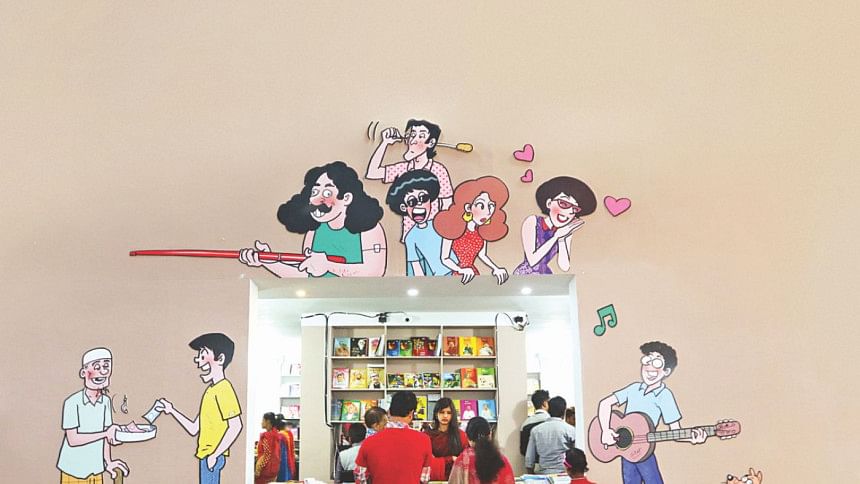How We See Boi Mela

My earliest memory from there is when I was 4 years old – I went with my parents and I bought every available Disney book which I read and re-read until they were torn. Ever since then I have been in love with this temporary piece of heaven that I only get to experience for 28 days (Add one more day in leap years; 2016, what a great time to be alive!) a year. This time, I thought of reaching out to a few people, each of whom has experienced the magic of Boi Mela in their own ways.
Enjoying economically
Swastika Chakraborty, a student of Botany at Dhaka University, has always made the best of Boi Mela by spending wisely. "Whenever you're visiting the fair, remember that there's strength in numbers. I always go with a bunch of my friends and none of us buy the same books, so we can exchange and read as many books as possible." She reminisced about the times when the fair hadn't been extended beyond Bangla Academy, saying "That was the Boi Mela of my childhood, you see. My father would take us there when we were little and he'd buy us amazing children's books. Children's literature in Bangladesh is not the same any more, and now many of the book stalls are at Suhrawardi Udyan; I miss the old, more compact mela."
Breaking stereotypes
Anindya Banerjee was a student of Chittagong Grammar School, and is currently a student of IBA, DU. While preconceived notions suggest that English medium students are absolute noobs when it comes to Bangla literature, Anindya begs to differ. "One might think that I would want nothing to do with a book fair that's all about celebrating the Bengali language. The very simple answer to that is that not everyone's the same. Having grown up in a culturally aware environment at home, books and cinema were my only escape from the dreariness of sixth grade Social Science. Since my parents endorsed my indulgent behaviour, every Boi Mela was to me an opportunity to let out my inner bookworm, and reacquaint myself with Himu and Misir Ali," he says. Even though he's left with empty pockets at the end of every February, he thinks it's a pretty good trade-off for shelves full of new books.
Making time
As is the case for most little girls, Salma Meher Aieshee was introduced to Boi Mela by her dad. Then one day, she herself was old enough to take her little sisters to the mela. Salma is currently working as a senior executive at a telecom company, and she told me how things have changed since childhood. "Everything, from the people I used to go with to the writers whose books I used to look forward to, has changed completely. The only thing that remained the same is my undying love for books and this magical event that celebrates books. The more time passes, the harder it becomes to attend every year but I wouldn't miss it for the world. Some years I've even taken a day-off from work just to go to the mela."
Passing it on
One of the very few things me and my parents enjoy doing together is going to Boi Mela. This is also the only time of the year when they don't give me lectures on the importance of saving money. I wanted to know what it's like at their end, so I talked to Afroza Hossain, a professor at DU and mother of three. "I go to Boi Mela every year and nowadays chaperoning a bunch of kids to the fair feels great! Every year I usually take my own kids, their friends, and my nieces and nephews. I don't even think of this as 'added responsibility'. I absolutely love the enthusiasm the kids show, and it makes me feel very happy to see that I have passed on my love for books to my kids," she tells me.
A writer's fete
For writers and publishers, the experience is quite unique. This is their best opportunity to market their books, and they make sure to get everything right. Renowned cartoonist and journalist Sharier Khan has had a graphic novel published this year, and his comic books have been very popular for a long time. He says, "Ekushey Boi Mela is undoubtedly the most important event for writers and publishers. We make sure we are well prepared for it, and it is the biggest commercial incentive for us as well. Writers get to use their creativity to the fullest, and I would say that the people in Bangladesh have continued this beautiful habit of reading books mostly because Boi Mela exists. This is the only time when readers get everything they like at the same place and at a fair price. We must ensure that we are providing the best content in our books for this trend to be upheld. As long as we give the readers books that they enjoy, this event will remain the phenomenon that it is."
Memories from miles away
I've lived in Dhaka my whole life and currently my campus is just minutes away from Boi Mela; daily trips have become a habit. But not everyone is as lucky. Moneesha Kalamder, a student at University of Waterloo in Canada, has missed her favourite event for three years in a row now. "I spent a significant part of my life living on Jahangirnagar University campus, and made an annual pilgrimage to Boi Mela. In my family, it was a big deal. My parents, my uncles and aunts would all give us a special allowance just for the mela and they would take all our cousins together. As we moved to Dhaka and I grew up, I would go to every Boi Mela more than once. I saved money throughout the year, and added that to my 'Boi Mela allowance'. Every memory of the mela is a special memory," she says, adding, "Now that I look back, Ekushey Boi Mela captures the very essence of everything I love: books, fantastic times spent with friends and family, a chance to see my favourite writers and of course, fuchka. Boi Mela is home. Now, it's hard to find time for anything, yet I feel an excitement starting to build as January starts, and as I realise that Boi Mela would go on without me, that feeling gets tainted with sadness, but I can't let go of that excitement even though I have nothing to be excited about, really. It has become an instinct."
Boi Mela has a special place in all our hearts, no matter where we come from or what we do. Every year we go there with our loved ones, and a day spent there is like a day spent in book lovers' paradise. I hope it's the same this year, I hope that you get to buy all the books you want and have as many fuchka as you can. Most important of all, I hope we all make the best memories with the best people at this magical place.

 For all latest news, follow The Daily Star's Google News channel.
For all latest news, follow The Daily Star's Google News channel. 



Comments